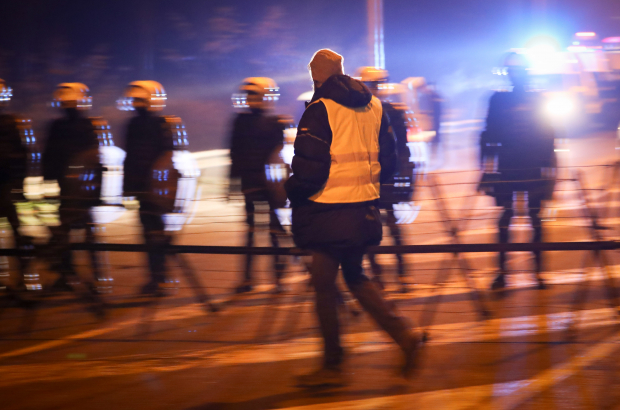- Daily & Weekly newsletters
- Buy & download The Bulletin
- Comment on our articles
Gilets Jaunes attempt to block Brussels petrol depot
The gilets jaunes, or yellow vests, protests have crossed from Wallonia into Brussels. So far the protest – ostensibly against petrol prices – had been confined to Wallonia, which had joined the initial movement in France.
The leaderless movement has been staging protests across France and Wallonia for a week. The message is that the tax on petrol makes it unaffordable, but there is also a complaint against the increase of the cost of living in general.
“The gilets jaunes are middle-class people who are trying to make it clear that they have a difficult time making ends meet every month,” said Tommy Leclercq, governor of the Hainaut province. He referred to the group as the “real gilets jaunes”, who are distancing themselves from the rioters who have set fire to petrol tankers and attacked an RTBF news crew, pelting them with glass and destroying equipment.
“We have nothing to do with that,” an anonymous gilet jaune told VRT. “We want to call attention to the high prices in a peaceful manner.”
According to Leclercq, people have shared the location of gilet jaune protesters on Facebook and showed up sporting the yellow safety vests to blend in and cause trouble. Nearly 40 rioters have been arrested this week n Feluy.
Petrol shortages
In the meantime, the gilet jaunes blockades are leading to a petrol shortage in the region. They are blocking access of tanker trucks to depots in Wallonia, meaning that the trucks are unable to load up and deliver petrol to local garages. Total has reported that half of their fuelling stations in the region are empty.
Today, the movement crossed the regional border into Brussels. Protesters blocked access to the petrol depot in Neder-over-Heembeek in the north of the capital. Police, however, broke up the blockade and quickly re-opened access to the depot.
So far no petrol shortages have been reported in Brussels or Flanders. According to Maarten Matienko of auto federal VAB, the protests are unlikely to break out in the northern part of the country.
“First of all, the average income is higher in Flanders than in Wallonia,” he told VRT. “So in Wallonia, people feel the high prices more by the end of the month. They also live further from their jobs and have to drive longer distances. They commute more with their cars because public transport is more limited.”
Photo: Virginie Lefour/BELGA

















